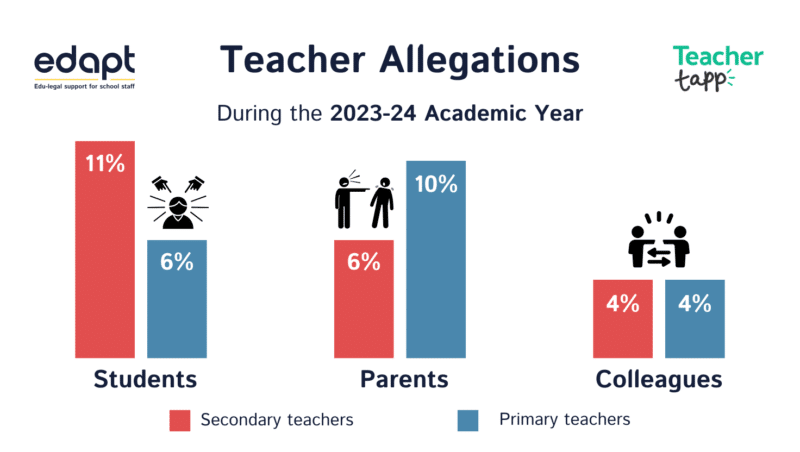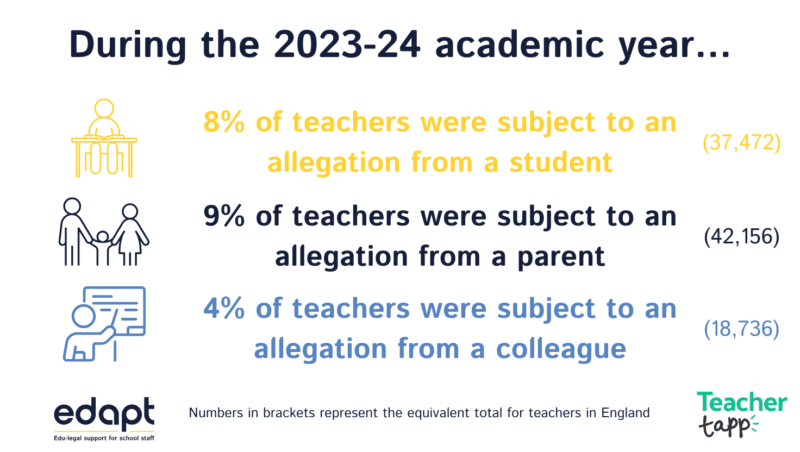75% of teachers cite “legal/employment support and protection against allegations” as the primary reason for joining a trade union or an alternative like Edapt (Teacher Tapp 2023). While trade unions play an important role in the education sector, at Edapt we believe that teachers should have the option to access this support and protection without having to join a campaigning organisation. But are teachers right to be worried about allegations, or are these concerns overblown? How many allegations were made against teachers last year?
Whilst it is a significant issue for teachers, there is surprisingly little national data on the extent of the problem. The last time the Department for Education explored this topic was in 2012, and the study only covered 34 schools. To better understand the current situation, we partnered with Teacher Tapp to ask teachers directly about their experiences.
At the end of the 2023/24 academic year, Teacher Tapp surveyed 7,869 teachers, asking if they had ever been the subject of an allegation—whether unfounded or otherwise—from:
- A student
- A parent
- A colleague
Unfortunately, the findings were stark and concerning.
 When we extrapolate the data from this representative sample to the teaching workforce in England, the numbers reveal that tens of thousands of teachers could have faced allegations in the last academic year.
When we extrapolate the data from this representative sample to the teaching workforce in England, the numbers reveal that tens of thousands of teachers could have faced allegations in the last academic year.

Whilst data doesn’t tell us anything about the validity of the allegations, Education Support’s 2024 Teacher Wellbeing Index showed that 43% of teachers felt that vexatious claims—those lacking merit—had increased over the past year.
Why are there so many allegations against teachers?
This is an important question that is certainly worthy of further investigation. A report by Dame Sara Khan published earlier this week showed public trust and social cohesion falling across the UK and so this could be part of a wider societal trend. Additionally, last year saw an increase in school suspensions and exclusions which can be used as a proxy for behaviour. Of course there may be other reasons at play here and policymakers may choose to investigate further given the current focus on teacher recruitment and retention.
What is the Impact of These Allegations?
The spectrum of allegations can range from minor issues to very serious claims that can lead to police investigations. Guidance in Keeping Children Safe in Education (KCSIE) emphasises that when handling allegations, schools should:
- Apply common sense and judgment,
- Address allegations quickly, fairly, and consistently, and
- Provide effective protection for children while supporting the person subject to the allegation.
Due to their legal duty to safeguard children, schools often prioritise compliance with safeguarding obligations over the potential impact on the accused. This is not to say that schools disregard the well-being of their staff; however, they typically adopt a highly cautious approach. While this approach is understandable, as it aims to minimise risk to children, it can sometimes appear to conflict with common sense—a concept that is inherently subjective and difficult to define. This cautious stance often results in prolonged processes, which can take a significant toll on the accused, particularly on their mental health.
What Should You Do If an Allegation Is Made Against You?
Get Support. This is why we strongly advocate that all teachers join Edapt or a teaching union. Dealing with allegations is rarely straightforward, and having access to expert, holistic support can make all the difference. Due to the high cost of providing these services, this support is only accessible to those with active memberships and unfortunately too many staff run the risk by not being a member of Edapt or a union. Every day we field calls from teachers who are not members of either and both ourselves and unions are limited in the support we can offer. It’s a bit like wanting to be a member of the RAC/AA but only paying on the day your car breaks down.
At Edapt, we believe effective support consists of two critical strands:
- Legal Expertise: Teachers need access to professionals who understand the intricacies of employment law, safeguarding legislation, and relevant guidance.
- Emotional Support: Equally important is access to mental health experts who can provide tailored emotional support during what is often an incredibly challenging time.
We also think that support should be immediate and not dependent on the availability of local representatives. At Edapt, our approach ensures that teachers have round-the-clock access to specialists who can guide them through the process with professionalism and compassion. For more information on a
Facing an allegation from a pupil, parent or colleague can be a distressing experience, but you don’t have to navigate it alone. With the right support, you can focus on teaching with confidence, knowing that your well-being and professional reputation are protected.
Subscribe to Edapt today from as little as £8.37 per month to get access to high quality edu-legal support services to protect you in your teaching and education career.
SubscribeLatest Support Articles
Our support articles provide up to date advice on a wide range of topics including pay and conditions, maternity and paternity, dealing with allegations and staying safe online.
